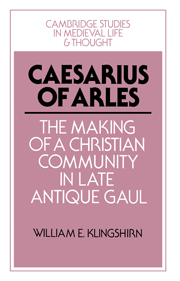Book contents
- Frontmatter
- Contents
- List of maps
- Acknowledgments
- List of abbreviations
- Concordance of Caesarius's Letters
- Map 1 The diocese of Aries and environs (c. 500)
- Map 2 The city and suburbs of Aries (c. 530)
- Introduction
- 1 In search of the vita perfecta
- 2 Late Roman Aries
- 3 The making of a reformer
- 4 Visigothic Arles and its bishop
- 5 The Ostrogothic peace
- 6 Christian rhetoric and ritual action
- 7 Christianity as a community religion
- 8 The limits of christianization
- 9 The coming of the Franks
- 10 The legacy of Caesarius
- Select bibliography
- Index
- Cambridge Studies in Medieval Life and Thought Fourth series
1 - In search of the vita perfecta
Published online by Cambridge University Press: 02 December 2009
- Frontmatter
- Contents
- List of maps
- Acknowledgments
- List of abbreviations
- Concordance of Caesarius's Letters
- Map 1 The diocese of Aries and environs (c. 500)
- Map 2 The city and suburbs of Aries (c. 530)
- Introduction
- 1 In search of the vita perfecta
- 2 Late Roman Aries
- 3 The making of a reformer
- 4 Visigothic Arles and its bishop
- 5 The Ostrogothic peace
- 6 Christian rhetoric and ritual action
- 7 Christianity as a community religion
- 8 The limits of christianization
- 9 The coming of the Franks
- 10 The legacy of Caesarius
- Select bibliography
- Index
- Cambridge Studies in Medieval Life and Thought Fourth series
Summary
BURGUNDIAN CHALON
At the time of Caesarius's birth in 469/70, the western Roman empire was on the verge of permanent dissolution. In many regions barbarian rulers had already exercised a virtual sovereignty for some time, with or without the cooperation of local Roman officials. Vandals controlled north Africa, and Saxons Roman Britain; Visigoths and Suevi ruled much of Spain, and Rugians dominated Noricum. Control over Gaul was divided among Bretons and Saxons in the west, Franks in the north, Burgundians and Alamanni in the east, and Visigoths in the southwest. Only Italy and Provence remained under the direct control of the west Roman government in Ravenna. In other areas, such as the province of Tarraconensis in Spain and the territory of Clermont in Gaul, Roman officials and local nobles maintained a tenuous independence without the help of imperial armies. This soon came to an end, however. By the mid-470s Visigothic armies were in control of Tarraconensis. In 475, Clermont was ceded to the Visigoths in exchange for Provence, an agreement that acknowledged Gothic conquests without acknowledging Gothic sovereignty. When Odovacar deposed the usurper Romulus Augustulus in 476 and refrained from replacing him, imperial rule in the west came to an end. Odovacar took charge of Italy and the Visigoths annexed Provence. The apparently independent Roman officials who surface in Gaul after this date, such as Arbogast, count of Trier, and Syagrius, “king” of the Romans at Soissons, may well have exercised a restricted authority in cooperation with the Franks.
Caesarius was born and brought up in the territory of Chalon (Cabillonum), a busy port on the Saone, located at the strategic crossroads between Langres, Besançon, Lyon, and Autun.
- Type
- Chapter
- Information
- Caesarius of ArlesThe Making of a Christian Community in Late Antique Gaul, pp. 16 - 32Publisher: Cambridge University PressPrint publication year: 1993



